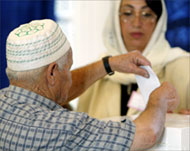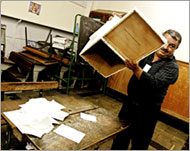Algerians approve amnesty
Algerian voters have overwhelmingly approved a partial amnesty for hundreds of Muslim fighters intended to end more than a decade of civil war, Interior Minister Noureddine Zerhouni said.

He told a news conference on Friday that “97.43% voted ‘yes'”, adding that almost 80% of the country’s 18.3 million eligible voters took part.
The referendum on Thursday was on whether to approve a “charter for peace and national reconciliation”.
The long conflict isolated Algeria amid atrocities by insurgents and allegations of crimes by security forces.
Algerians turned out en masse to vote on the peace charter presented by President Abdelaziz Bouteflika as the only hope of ending a conflict that has left 150,000 dead.
Zerhouni said the referendum’s approval will result in many of those jailed for the killings being freed.
“This strong turnout bears witness to the will of the Algerian people to resolve once and for all the crisis in Algeria,” Zerhouni said on public television.
Partial amnesty
Bouteflika launched a “civil reconciliation” initiative at the start of his first five-year term in 1999, leading to a partial amnesty for thousands of Muslim fighters who laid down their arms.
The programme was endorsed overwhelmingly in a referendum, and Bouteflika was re-elected in 2004 largely because the peace initiative helped quell the fighting that erupted after the army cancelled an election in 1992 which Islamist politicians were poised to win.
 |
|
Critics say the vote is an attempt |
The violence has eased considerably in recent years, but some 50 people have been killed in September during referendum campaigning.
The government estimates there are about 1000 armed extremists, whose aim is to install an Islamic state, still at large in Algeria.
Most of the fighters are believed to be from The Salafist Group for Preaching and Combat (GSPC).
The United States said it would respect the results of the referendum, but added that it would have preferred to see a broader public consultation on reconciliation.
“While, in our view, it would have been important to have a full public airing of views on the vital issues of reconciliation, we will respect the decision of the Algerian people as it is reflected in the balloting on this referendum,” State Department spokesman Sean McCormack said.
Kabylie unrest
The voting did not go off without incident, correspondents contacted by AFP said, with youths destroying ballot boxes in the troubled Kabylie region in northeastern Algeria, where turnout was lowest.
Turnout in the region’s capital Tizi Ouzou stood at just 11.40%.
 |
|
Bouteflika says insurgency has |
A smiling Bouteflika voted mid-morning on Thursday in a booth in Algiers, as did Prime Minister Ahmed Ouyahia, who called the referendum “a turning point, without any doubt, which is fundamental in moving out of the crisis that this country has experienced”.
The new charter will end legal proceedings against detained, exiled or fugitive Muslim fighters who have already halted their armed activity.
Only “those involved in mass massacres, rapes and bomb attacks in public places” will be excluded from the amnesty.
Opposition and human-rights groups, however, urged voters to reject the charter saying it merely sweeps years of suffering under the carpet and gives the president new powers.
Denial of truth
Amnesty International, the London-based rights group, said the charter absolved the military of their part in human rights abuses and would prevent other crimes from being probed.
“Such provisions are inconsistent with Algerias obligations under international law and may be a final denial of truth and justice to hundreds of thousands of victims and their families,” it said in a statement.
 |
|
The result of the referendum will |
Algeria’s opposition Socialist Forces Front (FFS) says it “cannot endorse a text that glorifies force and deprecates political mediation, consecrates impunity and amnesty, and in the end negotiates away pain and suffering”.
The independent Algerian League for the Defence of Human Rights (LADDH) described the referendum as “scandalous and absurd”, claiming “nobody has a right to vote no”.
“We are not against peace and reconciliation, but we do oppose this charter since we don’t think it will bring peace,” LADDH President Abdennour Ali-Yahia said.
“The head of state will be able to rule by decree and curtail all liberties by claiming that this charter is a people’s mandate.”